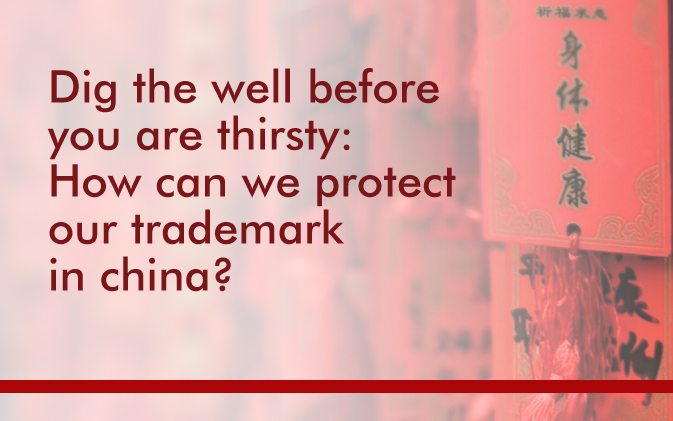Over the last decade, the global market has had a clear protagonist that has undoubtedly modified the paradigm of the world’s economic leadership: China. Nowadays, the Asian giant is one of the main centers of attraction for investment and its market of more than one billion potential consumers is in the spotlight of a number of companies. Therefore, due to the opening of what can be considered the last great frontier, globalization has enabled an opportunity to obtain a great projection of trademarks in this particular Asian market.
If the internationalization of trademarks usually involves the definition of a 360º strategy and investment planning at this stage must be considered, these aspects are especially important when disembarking commercially in a country as traditionally protectionist as China. Securing intellectual property rights in this country can be very complex, not only to protect a trademark against the competition but, in this particular case, the risk of local copying means that prior measures must be taken by companies that will carry out export projects. The following text describes a series of tips and practical steps for companies that consider China as a strategic market.
One of the most important steps is the trademark registration before starting any kind of activity. Based on the First-To-File jurisdiction (the first that registers a trademark has priority over the first that uses it), the number of companies that have found out that their trademark is already registered in China by business partners is extremely high.
Securing all aspects prior to commercialization is highly recommended. This can be done by signing confidentiality agreements, contracts with business partners, and registrations of the rights inherent to the company, both in the local Intellectual Property Office and in Customs, in order to avoid the settlement of disputes through agreements that establish an economic compensation.
In order to access business platforms and e-commerce sites, as well as to establish working relationships with distributors and other business partners, the trademark must be registered. For this reason, caution must be exercised with the business partners through which the company acts, since on many occasions they proceed to register the trademark as if they were the legitimate owners. Although in many cases this is done in good faith, this situation would involve a series of additional procedures, which could be complicated if the business relationship were to be put at risk at any time.
Last but not least, and taking into account the Internet as one of the most widely used channels of commerce, the importance of domain name registration is a simultaneous process with trademark registration to fully protect assets, such as an additional domain name ending in “.cn” which is often useful for commercial purposes.
Focusing on the trademark field, the regulation on the Trademark Law contains certain specialties, given by the language, its characters and tones, and therefore, the Chinese market offers a wide variety of options when it comes to establishing under which logo the commercial activity will be carried out. Since a trademark may consist of a word, phrase, symbol, design, color combination, product configuration, set of letters or numbers, or combination thereof, with the aim of preventing consumers from being in any doubt as to the business origin of that product or service, and ensuring that there is no confusion in the marketplace between the different signs, a prior search system will be decisive in determining the chances of success of a new registration.
In the Asian market, it is advisable to study the possibility of translating a trademark into Asian characters, so the brand strategy has many more nuances to consider. In order to make the trademark more recognizable and attractive in China, it is advisable not only to register the trademark with the Western alphabet, but also to “transform” the trademark in parallel on the basis of the alphabet of the target country, choosing between a literal translation, adapting the trademark to sound the same (phonetic translation) and/or choosing a translation with a meaning suitable to the purpose of the trademark, based on the individual meanings of those characters. All this will enable the protection of the trademark in a global and complete way.
For example, Coca Cola is translated as “Ke Kou Ke Le”, which not only sounds similar to the English name, but could also be translated as “happiness in the mouth”.
Given that the registration period will be ten years from the application date, and it can be renewed without limitation for periods of equal length of time, it is highly advisable to take all the previous measures and not fall into actions and negotiations that may last years, as has been seen in trademarks such as Jordan, Apple or Peppa Pig, involving an investment of time and money. The comparison of making a prior investment in market research and registration options is very beneficial given the deadlines of protection that can be achieved.
Many companies find out that their trademarks have been previously registered by third-parties with whom they are not related at all. Therefore, they encounter a barrier to the use of the trademark and the development of their business activity. In the fight against the network of counterfeiters and extortionists that protect other people’s trademarks in different territories to get benefits from the sale of products or the sale of trademark registrations to legal owners, additional measures have been taken in China to gradually unify regulations and deal with these acts of bad faith.
Therefore, companies can recover trademarks registered by third-parties in an act of bad faith, initiate procedures to request economic compensations based on the damage, and, in turn, destroy the tools and raw materials of such third-parties, having the option to act against the agency that applied for the trademark registration on behalf of the owner, extending the liability for administrative sanctions, warnings, and fines. The regulation amendment will undoubtedly speed up the recovery of rights that are necessary to act in China since, until now, many of the alternatives have required stopping the activity for several years until action can be taken against such registrations.
As stated, recommendations always involve taking prior measures before initiating any type of activity or contact with third-parties in China and even defining a strategy before applying for protection in any country.
Knowing the importance of these previous procedures, selecting distributors and commercial partners, signing confidentiality agreements during negotiations, and defining the protection of intellectual property assets (trademarks, patents, domains, among others), as well as defining additional strategies such as taking measures against counterfeits or the registration of products in customs can ensure effective and efficient business development.
Every precaution taken will be beneficial as an ancient Chinese proverb states: “Dig the well before you get thirsty”.
Ramón Moreda, Process Manager | Trademarks Department.




